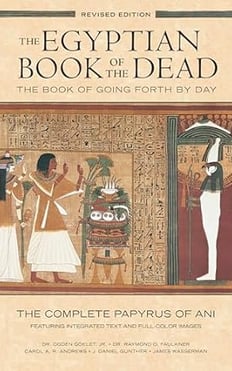Universal Moral Values: Comparing the Ten Commandments & Egyptian Book of the Dead
Explore the similarities between the Ten Commandments and the Egyptian Book of the Dead, highlighting how universal moral values like prohibitions against murder, theft, and false witness reflect simple truths taught across cultures. Discover why these ethical principles are foundational to human societies and appear independently in diverse traditions.
Core Moral Principles
The Ten Commandments, found in the Bible, offer a set of moral directives given to the Israelites. They include:
Prohibition of Murder: "You shall not murder" (Exodus 20:13).
Prohibition of Theft: "You shall not steal" (Exodus 20:15).
Prohibition of False Witness: "You shall not bear false witness against your neighbor" (Exodus 20:16).
Respect for Property and Relationships: "You shall not covet" (Exodus 20:17).
Similarly, the Egyptian Book of the Dead, a funerary text, includes ethical teachings in its "Negative Confessions," such as:
Prohibition of Killing: "I have not killed" (Spell 125).
Prohibition of Theft: "I have not stolen" (Spell 125).
Prohibition of Lying: "I have not spoken lies" (Spell 125).
Respect for Others' Property: "I have not coveted" (Spell 125).
Universal Moral Values
The parallels between these texts highlight the universality of certain moral values. These are not necessarily direct borrowings but rather expressions of fundamental ethical truths that many cultures recognize and uphold. The idea that murder is wrong, stealing is unethical, and honesty is crucial are principles that resonate across diverse societies. Such values are foundational to social cohesion and have likely been emphasized from a young age in many cultures.
Simple Truths Taught from Birth
The similarities between the Ten Commandments and the Book of the Dead can be seen as reflections of simple truths that are taught universally, often from birth. These principles are integral to human societies, forming the basis of trust and cooperation. They are so fundamental that they appear in different cultures independently, illustrating their inherent value in promoting ethical behavior.
For instance, the prohibition of murder and theft is essential for any society to function smoothly. These are basic rules that protect individuals and maintain social order. Similarly, values like honesty and respect for others' property are crucial for fostering trust and goodwill.
Cultural Contexts and Ethical Foundations
While the Ten Commandments and the Book of the Dead come from different religious and cultural backgrounds, they both aim to instill ethical behavior in their respective communities. The Ten Commandments were given as part of a covenant with the Israelites, shaping their identity and laws. In contrast, the Book of the Dead provided guidance for the deceased to ensure a favorable judgment in the afterlife, reflecting Egyptian beliefs about moral conduct.
These texts illustrate that while cultures may develop their own frameworks for moral instruction, the underlying principles often converge on similar ethical standards. This convergence is not necessarily due to direct influence but rather a shared recognition of the importance of certain moral truths.
Conclusion
The similarities between the Ten Commandments and the Egyptian Book of the Dead serve as a reminder that some moral values are universal and have been recognized across different cultures and times. These ethical principles—such as prohibitions against murder, theft, and lying—are fundamental to human societies and likely have been taught from an early age to ensure social harmony and trust.
By understanding these similarities, we appreciate how core moral values transcend individual traditions and reflect a common human experience. The convergence of these ethical teachings underscores the timeless nature of certain truths that continue to guide and shape our understanding of right and wrong.
Timeless Truths: Understanding the Similarities Between the Ten Commandments and the Egyptian Book of the Dead
When we examine the ethical teachings found in the Ten Commandments and the Egyptian Book of the Dead, it's striking to see how similar they are in certain aspects. Both texts emphasize core moral principles like prohibitions against murder, theft, and false witness. However, it's essential to recognize that these similarities don't necessarily mean that one text copied from the other. Instead, they reflect simple, timeless truths that transcend individual cultures and have likely been taught from birth across different societies.
We hope you enjoyed this article. For further reading we recommend this book.
Please click on the image for details.
© 2024. All rights reserved.

